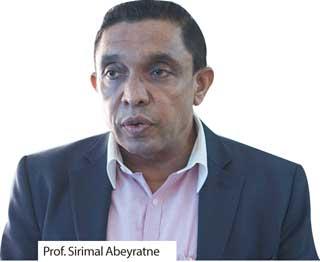21 Sep 2021 - {{hitsCtrl.values.hits}}
Reminding the famous saying that one must never waste a good crisis, a leading economist in the country opined that there has never been a better time for Sri Lanka to make the pressing and long overdue reforms in its economy through tough revenue and expenditure reforms.
 While Sri Lanka’s economic woes are not recent and predate the pandemic by several decades, the pandemic has aptly exposed its vulnerability and fragility by way of a foreign exchange crisis, shortage of food staples, higher prices, poverty and dwindling state income.
While Sri Lanka’s economic woes are not recent and predate the pandemic by several decades, the pandemic has aptly exposed its vulnerability and fragility by way of a foreign exchange crisis, shortage of food staples, higher prices, poverty and dwindling state income.
According to Sirimal Abeyratne, Professor in Economics and Head of the Department of Economics at the Colombo University, the current situation, however much it is tough, offers an ideal time to be exploited to make some painful and politically challenging reforms to put the country’s fiscal house in order for a sustained period, a reform which will fix most other issues elsewhere in the economy.
“I see the crisis as an opportunity. In fact, an opportunity we never had before,” Prof. Abeyratne told a webinar organised by the Sri Lanka Economic Association, last week.
He proposed both revenue and expenditure-side reforms in the budget, which have in fact been the talking points for decades but never got really implemented for a significant period.
For instance, he proposed the need for a better information system to fix Sri Lanka’s tax system, which has disproportionately been skewed towards indirect taxes, rationalising of the trade taxes and to eliminate the export bias to achieve sustained trade liberalisation and creating a conducive environment for investments, all of which would put Sri Lanka’s economy in a firm footing in the medium term.
Commenting on Sri Lanka’s highly lopsided tax system, Prof. Abeyratne reminded that direct taxes had never accounted for more than 25 percent of its total tax revenue at any given time, whereas in a country with a comparable income level to that of Sri Lanka, direct taxes account for 40 percent or higher.
He attributed this perennial issue in taxing in Sri Lanka to the lack of information at the hands of the government in respect of its people, their income and wealth and said successive governments had never made any attempt at putting in place a system, which can generate this information and make taxing more equitable.
Prof. Abeyratne also said Sri Lanka’s trade taxes engulfed with tariffs and para-tariffs have prevented trade liberalisation and economic freedoms, making its people poorer for generations.
Citing the World Bank data for 2018, the latest available such data, he said Sri Lanka’s trade taxes stand at an excessively high level of 18 percent as a percentage of government revenues, whereas in neighbouring India, such taxes constitute only 4.5 percent of its total revenues, 3.0 percent in Thailand, 2.0 percent in China and 1.5 percent in Malaysia.
In reference to how the economy was managed since the onset of the pandemic, he said deficit financing by the Central Bank is only a short-term tool and could not be continued for months and years without leading to excesses as seen at present. Sri Lanka is currently facing twin crises in its fiscal and external accounts, due to loss of tax revenues and shortages of foreign exchange, which has triggered some harsh import controls, causing commodity shortages and higher prices.
“We can’t depend on short-term solutions for a long-term problem,” Prof. Abeyratne said.
In the short term, his strategies aren’t much different from what the government is pursuing at present, as he proposed to borrow more from bilateral and multilateral sources to ride out the current external sector liquidity crunch and also suggested the option of disposing some state assets, however politically challenging it may be.
However, he doubted whether these have the ability to generate a couple of billions of dollars the country currently needs so dearly. The current external liquidity crisis isn’t something of this government’s own making, yet a combined effect of the pandemic-induced stresses on some key foreign inflows and the external borrowings accumulated by successive governments, particularly exacerbated from 2015 to 2019, when foreign borrowings tripled from US $ 5 billion to US $ 15 billion. The current administration’s strategy from its inception was to reduce reliance on the foreign section of the borrowings, yet the pandemic stepped in the way in making meaningful headway, albeit it has so far remained on course.
In this backdrop, Prof. Abeyratne opined he would have considered seeking the International Monetary Fund’s (IMF) assistance as the first resort and not the last resort because he believes whatever the conditions that may come with such a package are not for the IMF’s sake but for Sri Lanka’s sake, as they contain the long overdue reforms and adjustments in the economy.
24 Nov 2024 2 hours ago
24 Nov 2024 2 hours ago
24 Nov 2024 3 hours ago
24 Nov 2024 8 hours ago
24 Nov 2024 9 hours ago